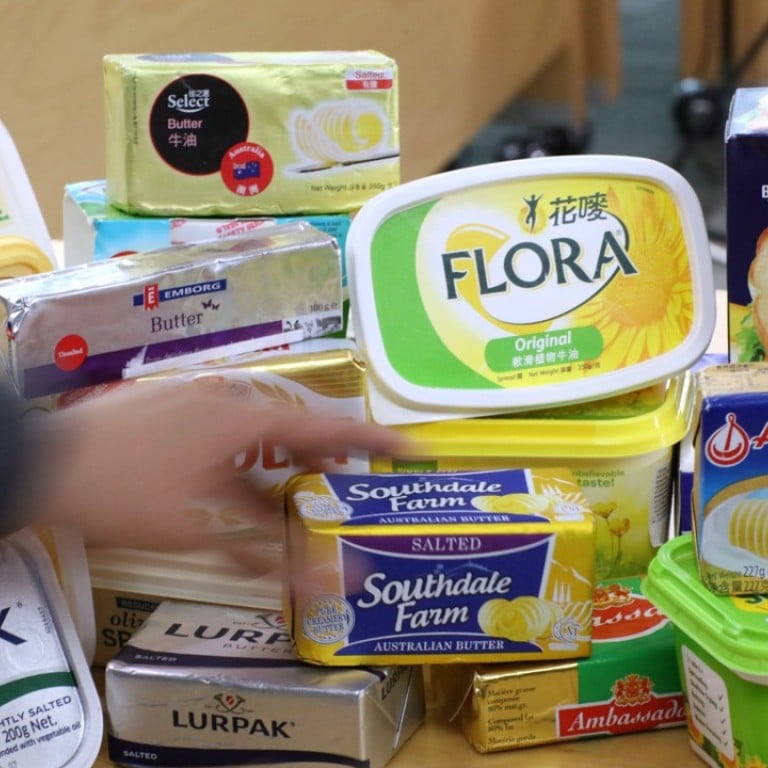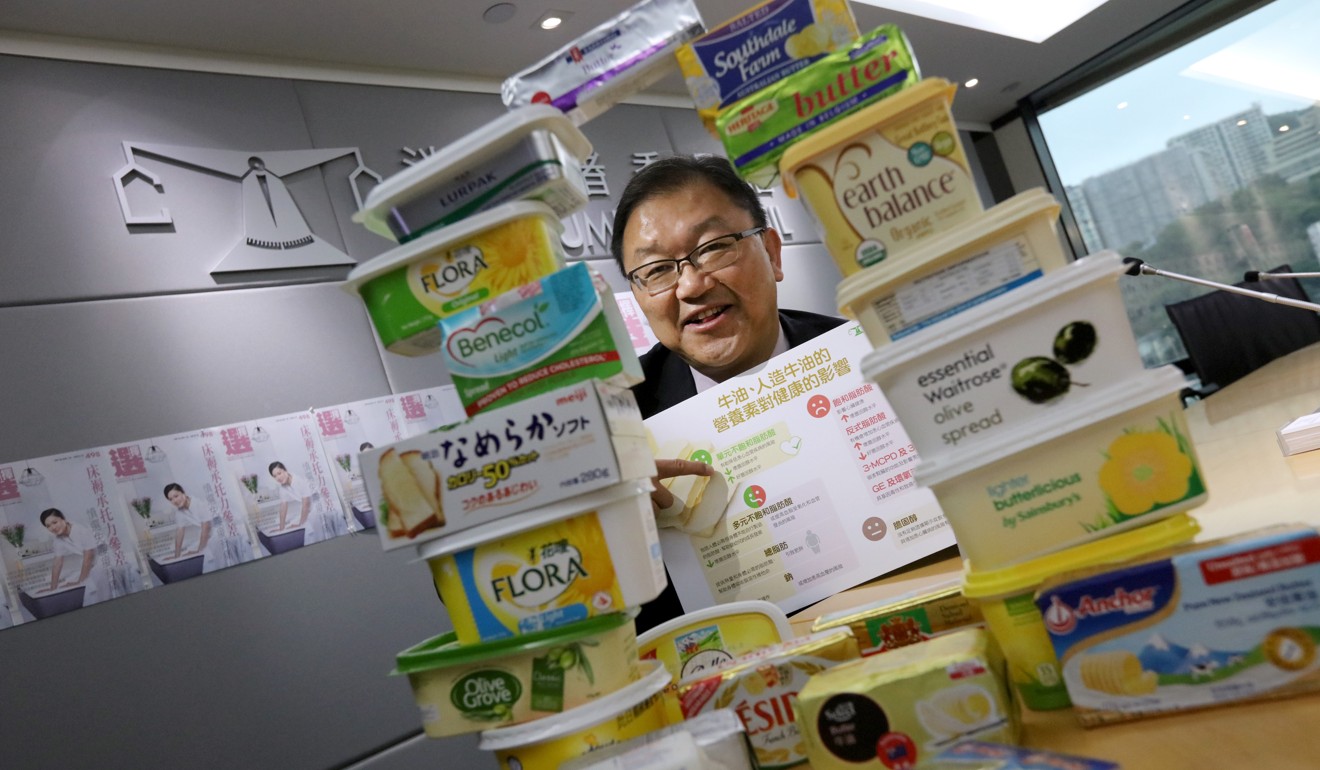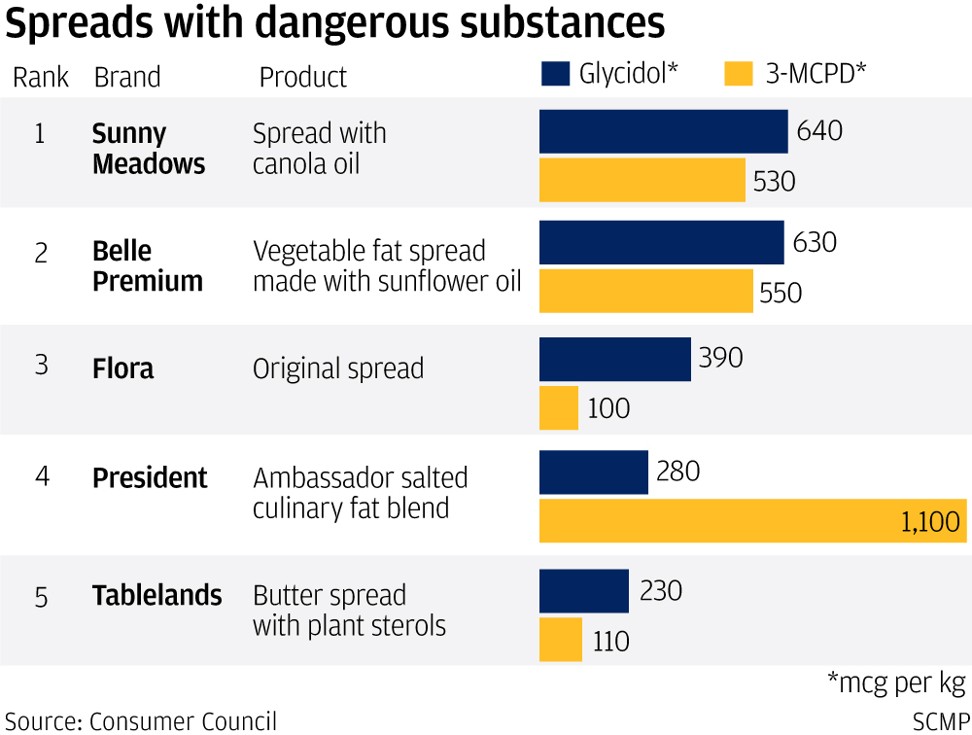
Almost 20 spreads sold in Hong Kong ‘could increase your risk of cancer’
The products have glycidol and most also have 3-MCPD, substances found in a host of processed foods, though the Consumer Council says ‘with normal consumption, the impact on health is minimal’
At least 18 margarine products sold in shops in Hong Kong contain glycidol, a substance thought to cause cancer, and at least 16 carry a by-product that can harm kidneys and male fertility, the Consumer Council said on Monday.
The watchdog revealed the findings from tests done last October on 30 items – nine types of butter and 21 products containing margarine. The latter comprised 16 margarine spreads, four blended spreads and one sample of shortening.
46 samples of cooking oil on sale in Hong Kong contained cancer-causing substance in tests
The test results found that of the 18 products, Sunny Meadow’s spread with canola oil contained the most glycidol, at 640 micrograms per kilogram.
The council’s chief executive Gilly Wong Fung-han said glycidol is “inevitably produced” when vegetable oil is heated during the refining process, and could also be found in a host of processed foods, including biscuits and pancakes.
Both she and Professor Wong Kam-fai, who chairs the council’s Trade Practices and Consumer Complaints Review Committee, said it was unrealistic to tell people not to eat anything that might contain the substance.
8 everyday products that could be harming you
“But, as glycidol is genotoxic and carcinogenic, consumers should reduce intake of food containing the substance as much as possible,” Wong said.
The European Food Safety Authority (ESFA) is set to publish its standards for glycidol intake this year. Last year it recommended that the intake of the by-product 3-MCPD should be no more than 120 micrograms per day for adults.
14 out of 15 children’s scooter models contain cancer-related chemical: Hong Kong watchdog
3-MCPD comes about when refining edible oils and is found in noodles, chips and even infant formula.
Among the samples, President’s Ambassador Salted Culinary Fat Blend contained the most 3-MCPD at 1,100mcg per kg.
But a person would still have to eat 24 teaspoons of the fat blend in a day to exceed the ESFA’s guidelines, the council said.
“With normal consumption, the impact on health is minimal,” Wong Kam-fai added.

The council said the Food and Environmental Hygiene Department’s (FEHD’s) Centre for Food Safety was drafting guidelines for manufacturers on reducing glycidol and 3-MCPD in food products. It urged the government to also introduce laws to regulate the use of these two substances in keeping with international practices.
Flora and Lurpak said they were taking measures to reduce the quantities of the two substances in their products, with Flora, and Anchor, saying they were in favour of receiving guidelines.
Meanwhile, the council said half of the 30 products it tested had inaccurate nutrition labels.
A product from Lurpak, for instance, claimed to have 36mcg of sodium per 100 grams of blended butter, but tests found the amount was 11 times more than it stated, at 410mcg per 100 grams.
38 out of 60 shampoos found to contain harmful manufacturing solvent in tests by Hong Kong consumer watchdog
Another item was found to have several vitamins not listed on its nutrition label, while other products did not state clearly if they contained a mixture of animal and vegetable oils.
Gilly Wong said the results had been submitted to the FEHD’s Centre for Food Safety and the Customs and Excise Department, for them to see if manufacturers had violated the Trade Descriptions Ordinance.
She said that after being notified of their mistakes, a number of manufacturers including Daisy, Lurpak and President had revised their incorrect labels.


